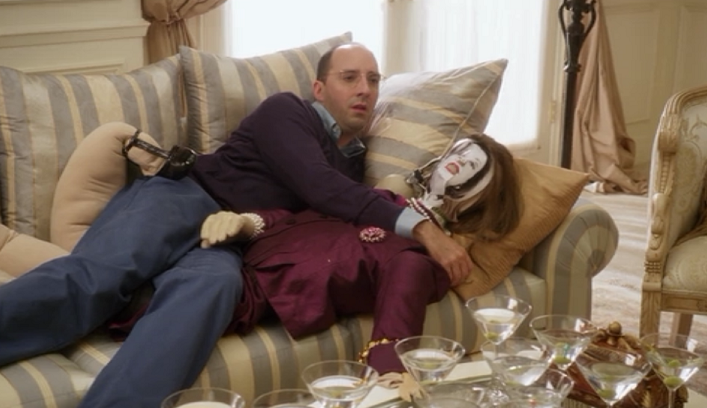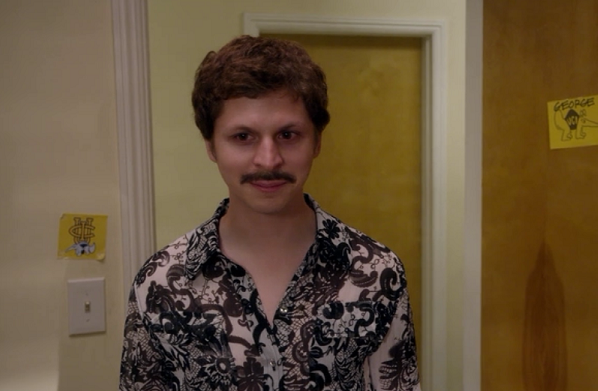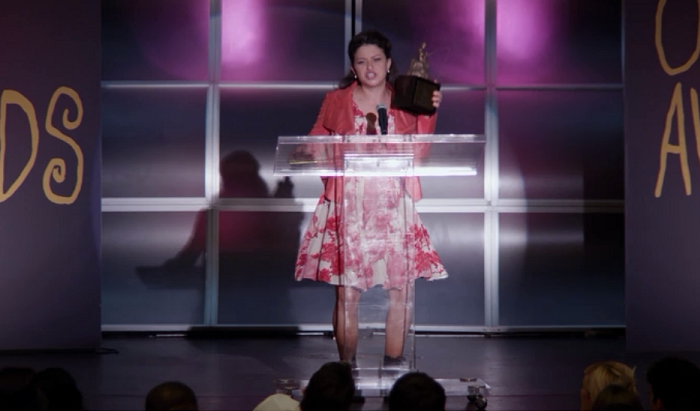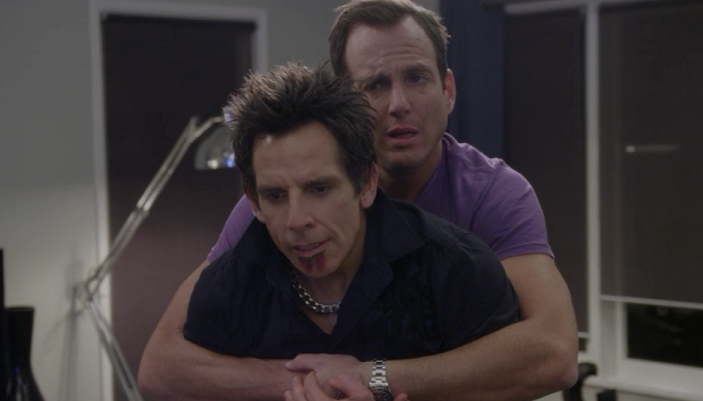The previous two episodes, which centered around Maeby and George Michael, were great and very good, respectively. They represent exactly the late-season upswing I had been hoping for, and I’m overall quite happy with them. And there’s no reason “Off the Hook” couldn’t have been just as good. Instead, though, it’s a reversion to the bottom-rung material that’s hung like a smothering cloud over season four. Those two episodes were flukes, and “Off the Hook” wants to make sure we know it.
By the way, I’m not just saying that this episode could have been as strong for rhetorical purposes. Buster, as a character, was very much in the same boat as Maeby and George Michael; he lives in the shadow of a parent, and while the fact that he’s an adult makes that somewhat more tragic, it was otherwise a great complement to the situations of the actual kids.
Maeby lives under parents who don’t notice her, George Michael lives under a parent who doesn’t hear him, and Buster lives under a mother who actively holds him down. And just as the previous two episodes explored how those children grow up when separated from that defining dynamic, Buster’s can do the same. The plot has already taken Lucille from him, so what now? Where does he go? What does he do?
Almost any other answer to that question would be more interesting than what we got, which is an episode that uses Buster as a hook (ahem) upon which to hang both the Love campaign and Lucille 2 murder-mystery aspects of the season…which we might as well start referring to for simplicity’s sake as the two least interesting turds on this mountain of shit.
Buster’s always been a fascinating character, mainly because the show never quite knew what to do with him. I don’t offer that up as a criticism, but rather an endorsement. Even without a clear character trajectory, Tony Hale managed to bring a level of naive sincerity to the character that made him at once the most likeable and most fucked-up Bluth. He rarely got episodes of his own, and was just as rarely an integral part of somebody else’s. That’s why “Off the Hook” has more or less carte blanche; we have no expectations. A Buster episode can be anything, so all they really need to do is make it funny.
So what do they do? Replace the hook with a giant robot hand that plays music and breaks things. Great character work, boys.
This is the problem I’ve had with Arrested Development all season; for one reason or another, the writers seem to think that puns and pratfalls define their characters…and that’s absolutely false. Audiences responded to Arrested Development for exactly the opposite reason: these were characters in spite of those things…not because of them.
Did we like GOB because he was a deluded, conflicted charmer, or because he chased people around with bees and had buttsex with men because lol buttsex? Did we like Lucille because she was an icy, domineering presence or because she wrote songs for comic-book musicals and tussled with offensive Asian stereotypes?
Season four not only takes the laziest route through these episodes, but it also takes the most irrelevant. Consider Buster’s hand. Yes, the fact that he gets a robot hand is true to the character in the sense that in season two he also had his hand replaced by something, but isn’t that the most superficial connection imaginable? It’s literally skin deep.
What does this new hand say about him? I could write pages about what the hook said about him, both specifically and in more general terms about the tragedy of a missing hand being inflicted upon the already tragic Buster. It was funny, and it had resonance.
The robot hand has neither. Buster absent-mindedly attempting to rub Oscar’s shoulders with a hook is funny, and it taps into character work going all the way back to the first episode. Buster standing in the kitchen while his robot hand malfunctions and plays silly music isn’t funny, and taps into absolutely nothing.
The writers then knew what to do with a hook, and that’s why they did it. The writers now know nothing of what to do with the robot hand, and they do it anyway. That’s the season four difference.
Seeing Buster at the start of the episode with Ophelia Love is a great beginning, mainly because of the good will engendered by the previous Buster relationships we’ve seen…not the least of which was with Lucille 2, which was always such a tragically perfect pairing in itself. We have every opportunity to trod interesting ground here, but it goes nowhere. Ophelia falls for him, then doesn’t want him, then the episode ends. And Gene Parmesan is back because I guess Martin Mull was free for another day of shooting and they didn’t want to waste him.
Of course I’m cheating slightly, because the Ophelia thing does tap into one aspect of Buster’s personality: his need to be mothered. This is something the episode toys with, which is great. What’s not great is that it only toys with it, and never bothers to explore it. We never get anything deeper than Buster repeatedly stating outright that he wants to be mothered. I know I’ve used this comparison already, but the more I think about it the more I really do believe that season four of Arrested Development is exactly what the Robot Devil sees in his nightmares.
That’s not character work, any more than Dickens making Scrooge say, “I’m such a mean old man, and so stingy, and I won’t change my ways until some ghosts come and make me” would qualify as character work. That’s just characters explaining, and in a season that already relies far too heavily on a narrator to do exactly that, it’s completely pointless. It doesn’t suggest an understanding of the character at all…it suggests that the writers reminded themselves of who the characters were by reading a paragraph-long bio on Wikipedia.
The episode ends, of course, with something that has genuinely nothing to do with anything we’ve been watching for the past half hour: Buster finding the “dead” body of Lucille 2 on the staircar. Huzzah.
It has nothing to do with the story we’ve just been told, which is bizarre, because you’d think showing the “dead” body of a major character would be…y’know…worth building up to, or something.
I really do believe they dropped the ball substantially with this mystery aspect of the plot. For starters, I don’t care about it…but here’s why I don’t care about it: the season doesn’t convince me I should care about it.
Over the course of 15 episodes we only get a handful of mentions of Lucille 2’s death or disappearance (it’s the latter, of course, but we might as well play along), and most of them are exactly that: mentions. I think we spend more time with the fuckin’ ostrich.
So season four doesn’t even seem to be interested in her death itself. Why should I? Lucille 2’s fate is a shocking moment, but it’s shocking mainly for just how clumsily it’s revealed. This isn’t clever, this isn’t interesting…this is just there. Here’s a character, here she is lying in some blood (it’s not, of course, but we might as well play along), here’s George Sr. dressed as a woman talking to the cops. Great stuff!
The best comparison point for this is probably the Rita arc in season three. While it wasn’t overtly positioned as a mystery the way this Lucille 2 crap is, it followed the general template: we get a sense there’s something strange afoot, we’re led to believe it’s one thing, all the while hints are dropped as to the truth, and we arrive, at last, at a revelation that causes certain details and moments to play differently in retrospect. The mystery is solved, and when rewatching we can pick up on new things for ourselves, and hear the same old dialogue in new ways. It’s great; Michael’s a terrible detective figure and we’re likely to arrive at the conclusion ahead of him, but that doesn’t make it any less fun.
Here’s the template the Lucille 2 mystery follows over the course of season four: nothing, nothing, nothing, nothing, nothing, nothing, she’s missing, nothing, nothing, nothing, nothing, DEAD BODY IN SOME BLOOD, nothing, nothing.
Like everything else, it’s just a thing that happens. It has nothing to do with the character, or any of the characters, at all.
Maybe she got an attack of vertigo and fell over. Maybe Gene Parmesan went insane and slit her up with that knife he bought for no reason a few episodes ago. Maybe GOB put a Tony Wonder mask on her and anally fucked her to death.
Whatever happened, I don’t care. Neither do the writers, and neither does the episode I just saw that climaxed (in the loosest possible sense of that word) with her unconscious body lying on the staircar.
Here’s what a mystery is: a story told in tantalizing and well-layed fragments that eventually resolves itself into a clearer picture for the audience and, often, the characters involved.
Here’s what a mystery is not: a cheap flash of an old woman in some blood, and the assumption that someone gives a shit.
Because we don’t.
You’re killing me, Buster.
Episode 14: “Off the Hook”
Central Character: Buster
Other Family Appearances: Lucille, Michael, Tobias
Most Clumsy Reference to Original Run: The literal doctor.
Scene That Most Needed Tightening: Buster falling out of his chair and the Army treating it like an actual plane crash. I’d like to say it sounds funnier than it is, but…you know.
Best Line / Exchange:
BUSTER: Well, they said the miniaturization comes later. I mean you remember how big your first cell phone was!
LUCILLE: That was a phone. This looks like you’re pointing to a place that buys your gold.



